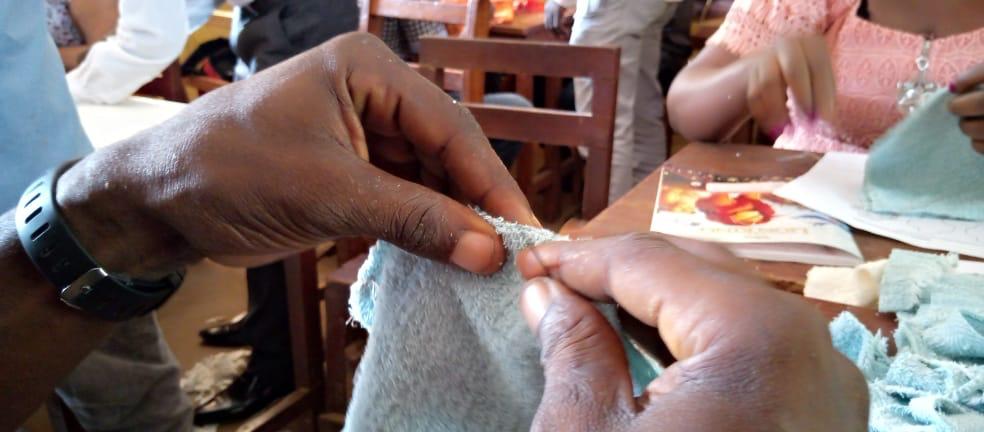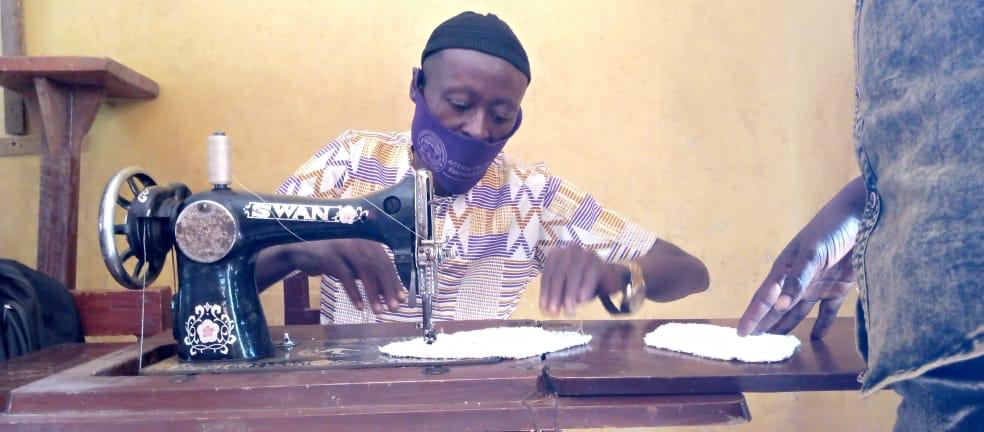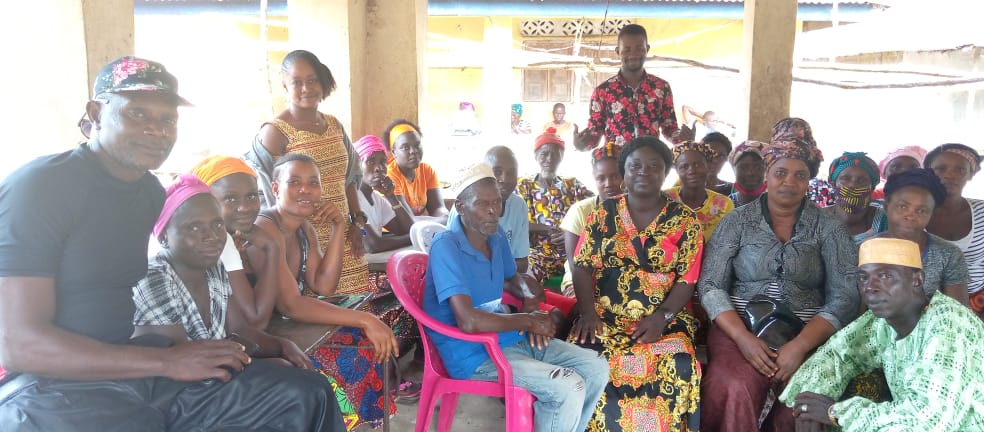Positive Environmental Impact of our Positive Period Project in Sierra Leone
In 2019, we set up our Positive Periods project in Sierra Leone. It is a sustainable solution to the need for menstruation protection products and health education that is accessible to all, including women and girls in remote areas with low income. By learning to make re-usable period pads from local materials, and tackling the stigma attached to periods through education, communities in Sierra Leone can share their knowledge and empower women and girls to take control of their lives. Girls can miss up to a quarter of their school education because they don’t have an adequate way of managing their periods, and are often told to stay at home during menstruation.
The Environmental Impact of Periods
Another very significant challenge is that for those who can afford shop bought disposable sanitary protection there is no way to properly dispose of these pads and they can end up in open landfill areas near to habitation and ultimately cause a health concern. Disposable pads do not disintegrate. Most menstrual pads are made from 90% plastic. It takes nearly 500-800 years for one sanitary pad to decompose as the sanitary pad's plastic is non-biodegradable. They also contain super-absorbent polymers (SAP), which don't decompose. They gradually break down into what are known as micro-plastics, which contaminate soil, water and air. They also enter the food chain injecting toxins into the food humans and animals consume.
There is also a huge carbon footprint that goes into making these products. Sanitary pads contain volatile organic compounds and phthalates and, according to a new study, continued, long-term exposure to these, a significant amount of these harmful chemicals could be absorbed into the body. Women around the world are concerned about the products they use and this is the case in Sierra Leone, we have interviewed many women who do not want to use disposable sanitary pads for this reason alone, not just the cost.

The aims of the Positive Periods Project
In an interview with Isata, the coordinator of the project, we wanted to explore life for women and girls before the Positive Periods Project.
Similarly to many countries, Sierra Leone suffers from an unequal literacy rate gap between their male and female citizens: in 2018, male literacy rates were 51.65% while female literacy rates were only 34.85%. This divide is a result of a range of factors including teen pregnancies, attitudes towards girls education, gender equality, access to health education and even the distances of schools from homes.
During the interview with Isata regarding life before the project, she explained that the embarrassment and taboo of menstruation and the development of female bodies also aided the lack attendance of girls to school. The fear of bleeding in class and the responses from not only their male peers but also their teachers, leads to girls to opting to stay at home, and in many instances, they are asked to stay home when menstruating.
One of the aims of the Positive Periods Project is to teach girls, women, boys and men how to make sustainable, re-usable period pads from local materials, to reduce the cost and the waste caused by disposable pads. This ensures that girls will always have access to period pads when they need them during menstruation because they can make them themselves.
Importantly the other aim of the project is to educate both men and women about gender equality, women’s health and development, and help remove the taboo around menstruation and the development of female bodies, to create a more excepting and fairer environment for both girls and women. This project has also been extended in some schools to include Gender Based Violence awareness and prevention training for teachers, and sexual health education and awareness for girls.
Implementation of the Project
During the interview with Isata, she reflected on how initially it was difficult to get schools to comply with the project. Factors such as limited government funding and the ingrained taboo towards women’s health among the communities contributed to this difficulty. To overcome these initial challenges Istata understood that the way to encourage people to engage is to ‘deliver with passion’. This was how she was able to get people to listen and make them aware aware of the importance of this situation, not only sustainable period products, but also women’s health, education and wellbeing. Those involved must truly believe it and teach with emotion.
The Steve Sinnott Foundation has launched the PPP in different areas of the globe and each community adapts it to fit their needs, their local circumstances and national issues. Within Sierra Leone, the types of volunteers, the specific needs of the teachers and the girls Isata talked to in the schools, along with the affordable materials they had access to, helped develop the project in the direction it needed to go to suit the specific needs of the recipients.
During the global Coronavirus pandemic the number of volunteers and access to materials decreased. Despite this, the project managed to persevere due to the prior training of teachers conducted before.
The training process for the project started with winning over the headteachers of 15 schools in 4 regions of Sierra Leone. This led to two teachers from each school, being invited to the workshop where they were taught how to make the re-usable period pads, and taught by psychologists and economists about womens health and the economic and environmental impacts of the project.
During the interview Isata emphasised that it was important that both male and female teachers were included in the workshop to break the taboo around womens’ health and bodies, to promote gender equality.

Results of the Project
Following the start-up of the Positive Period Project in Sierra Leone in 2019, Isata has recorded the influential changes that are currently being seen as a result.
To ensure the teacher training workshops are successful, teachers had to evidence that they would be able to pass on what they had learnt to the other teachers in their schools and to their students. In this way the training is cascaded down through the communities. Isata is then able to visit these schools to follow up and make sure that the training has been passed on and the girls are benefiting from this, and running additional workshops with pupils at school. She explained that other organisations had made the mistake of offering training, but not following up, so in many cases the training was not passed on and there was limited benefit. Working with The Steve Sinnott Foundation she was able to convey this concern and we made sure that following up was an integral part of the project.
Isata has been able to overcome the initial resistance and connect to the communities in Sierra Leone. She has been able to help the teachers to overcome the challenges they have faced in cascading the training down through their communities and make sure that the knowledge is passed on. In this way she has seen the numbers of girls benefiting from this work increase to an estimated 5 thousand in the three years that it has been running.
Overall, the project has been a success with Sierra Leone. Girls are now more willing to go to school during menstruation, they feel safer knowing that their teachers understand and are supporting them to do this. In many schools there are now reporting systems in place for girls to use if they feel unsafe or threatened as their bodies change and gain the attention of boys and men in their communities and school. As they become less embarrassed about menstruation and their bodies, and more aware of their rights and how to access them, girls are changing their attitude and expectations. This results in male teachers and students changing their mindsets towards women and girls, their health and menstruation.
One more outcome of the project is that women and girls are seeing the economic opportunity for themselves too. Some are acting on the potential to create an income from selling the re-usable pads they are making, and that offers them more independence and self-reliance too.
The Future of the project
After two years of the Positive Period Project running in Sierra Leone Isata has some big plans on how to develop this to ensure that it reaches more than the four regions that it is currently targeting.
Ideas on the expansion of the project in Sierra Leone include creating centres where women can access the materials necessary to create their own period pads, and information around womens’ health, pregnancy and gender equality, instead of only targeting schools. This could become an entrepreneurial venture to help women earn their own income, from learning how to make re-usable pads and how to run their own entrepreneurial enterprise. This was inspired by the pandemic when many started profiting from making sustainable masks to sell.
To support this next chapter, Isata needs more sewing machines for each local area, or centre. To create pads on a larger scale, more materials are needed, and tools such as scissors and clips. They also face other challenges including the lack of funding, which limits each school workshop to 30 children rather than 150, and the limited amount of material resulting in teachers expecting this to be provided with their training, all need to be resolved before the expansion of the overall project.

What next?
With the success of the Positive Period Project in Sierra Leone, The Gambia, Cuba and Haiti, we are aiming to enable more countries to benefit from this project.
It benefits women and girls in an economic way, enables them to access their education and not have to take time off, but as well as that, it benefits the environment. This is a win win project, benefiting women and the environment, which ultimately benefits the whole human race and opens up the future prospects for the entire planet.
Who knows, with an estimated 2 billion menstrual items being flushed down Britain's toilets each year, maybe women and girls in the UK would like to be involved in this benefit too. Exploratory workshops run here were successful and opened up the conversation around period poverty in wealthier countries, as well as women’s commitment to a more environmentally friendly way of managing our periods.
You can support our Positive Periods Project here




